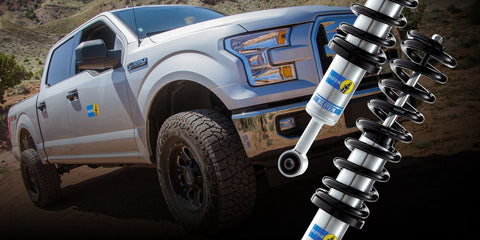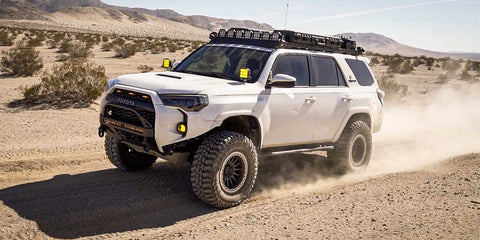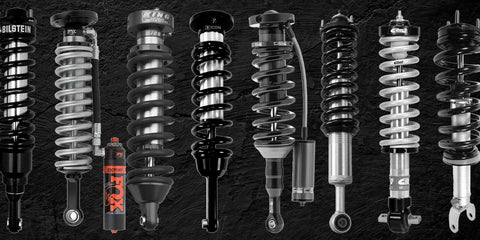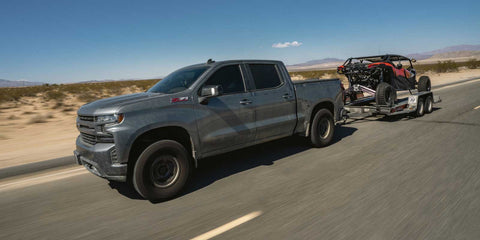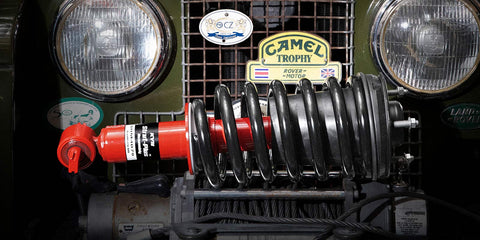Fox 2.0 vs Eibach Pro-Truck Shocks - Same Same, But Different
Posted by Sean Reyes on
In This Article
Whether you’re seeking more off-road capability, smoother on-road characteristics, load hauling, or just something to set-and-forget, understanding the nuances of these two shocks will guide you towards the best choice for your driving experience.
The ever popular Fox Shocks has been helping drivers navigate off-road terrain for decades, but only within the past 10 years has Fox had a widely accessible shock in the 2.0 Performance Series.
Eibach has been manufacturing suspension components for decades as well, but they were more in the passenger car and sport truck scene for most of their history. Recently Eibach has developed their Pro-Truck shocks and coilovers for the light truck market, to perform in off-road and tougher, more adventurous terrain.
We’ve tested both brands extensively across many of our own vehicles, read those individual reviews:
Daily Driver
Eibach
Aiming for an all around upgrade over stock, the Eibach Pro-Truck shocks deliver a bit more comfort than a factory shock on most applications. Factory shocks are usually pretty comfortable for a while, but quickly lose their damping ability after 10-20k miles, and that’s when the vehicle gets a little more sloppy, and bumps become a little more harsh.
The Pro-Truck shocks are engineered for 100K+ miles, with upgraded seals that reduce and prevent the loss of oil and nitrogen pressure, so ride behavior remains extremely consistent for the life of your vehicle.
There’s a noticeable long-term handling improvement for various conditions:
- Loaded vehicle, whether from lots of gear for adventure, or a mobile workspace
- Loaded vehicles with gear or equipment in the truck bed
- Towing requirements with added tongue weight to the rear of the vehicle
Fox
Its pretty unanimous around Shock Surplus, the Fox 2.0 shock is probably one of the most forgiving and softest shocks there is, at least for the 4 or 5 vehicles we’ve ran them on ourselves.
We’ve ran them on 2 of our Tacomas, the Ford Ranger, the Silverado 1500, the Ram 2500, and the Jeep Wrangler JL - check out those individual reviews.
The good thing is that the Fox 2.0 provides a lot of comfort improvements when compared to the stock suspension, as well as against other competitors like a Bilstein shock. If you’re currently running Bilstein, think of the Fox 2.0 shock as the complete opposite - high flowing linear piston with much more forgiving bump compliance.
- Excellent daily driven comfort
- More forgiving response on rocky trails
- Improvement to handling, while maintaining comfort, compared to stock shocks - especially compared to factory Rancho shocks
Off-Road / Trail Use
While the Fox 2.0 is softer overall, the more plush response can be detrimental depending on how you drive, thet load you’re carrying, and bumpstop quality.
If you like driving faster off-road, the Fox 2.0 is going to be all around more comfortable, and allow your suspension to move a bit more. Whereas the Eibach Pro-Truck shock maintains a bit more composure, and feels a bit more sporty over the same terrain.
Eibach valves some of their applications with a digressive tune, not an aggressive one like Bilstein, but definitely firmer feeling than the Fox 2.0. This is beneficial for those that like to carry loads, or like more terrain response when driving.
The aluminum body of the Fox 2.0 has an edge for longevity in the dirt and heat, where cavitation becomes a concern. Aluminum absorbs heat from the oil a bit quicker, and sheds it to the outside air faster, when compared to the steel body of the Eibach shock.
If you’re new here, cavitation is when the oil inside the shock heats up so much it becomes aerated, causing the shock to lose damping ability. The nitrogen gas in both of these shocks aim to help with that, but ultimately it will occur in high heat situations as the shock gets worked over extended periods of time.
Overlanding / Extra Gear
If you’re running a lot of extra gear on the vehicle, we’d recommend the Eibach over the Fox, the handling and body roll is noticeably improved with Eibach’s valving approach on the applications we tested - so we’ll assume its a blanket approach across their entire vehicle lineup.
One drawback to Eibach though is their lack of various lengths on a given application, whereas there’s usually various Fox 2.0 shocks to accommodate lifted vehicles. For instance, there’s a Fox 2.0 available for 2-3” lifts on the Tacoma and 4Runner, while Eibach only has a shock for 0-1.5”.
Shock Verdict
Eibach for handling, Fox for comfort. That’s mostly what it comes down to.
Other factors to consider:
- Eibach’s coilovers can be adjusted while on the vehicle, since the steel body allows for the preload collar to move under spring tension, the aluminum body of the Fox 2.0 coilover is much more fragile and should be used with a coil spring compressor.
- Eibach’s million-mile warranty is a lot more bulletproof than the Fox 2.0 1-year warranty.
- Fox 2.0 can be serviced and rebuilt like new, but this may not be beneficial to some buyers who turn over vehicles often or are planning on upgrading in the future.
There’s trade-offs for each shock, we’re here to help you figure out which one to run on your vehicle. Reach out to us if you need more assistance.













